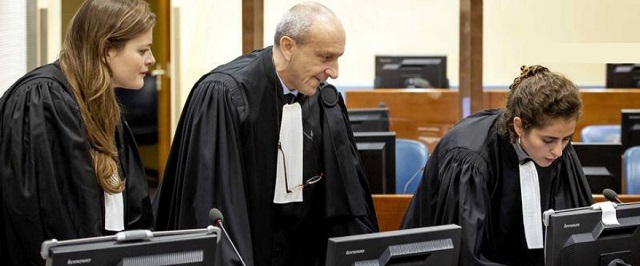
Felicien Kabuga faces three counts of genocide and two counts of crimes against humanity
| THE INDEPENDENT | A UN tribunal in The Hague has opened the genocide trial of a Rwandan businessman captured two years ago after decades on the run. The suspect, Felicien Kabuga, decided to boycott the trial opening and stayed in from his jail cell. But the judges said the hearing would go on.
Kabuga, a former businessman and radio station owner, is one of the last suspects sought by a UN tribunal prosecuting crimes committed in the 1994 genocide, when ruling Hutu majority extremists killed more than 800,000 minority Tutsis and Hutu moderates in 100 days.
“It is the understanding of the chamber that mister Kabuga is this morning well but has decided not to attend the hearing this morning either in person or via video link,” Judge Iain Bonomy said on Sept.29.
“The trial must proceed” with the opening statement of the prosecutor, judges decided.
Kabuga is in his mid-to-late 80s, though his precise date of birth is disputed. He was arrested in May 2020 in Paris between COVID-19 lockdowns and extradited to The Hague where he has entered a not-guilty plea. During his extradition hearings in France he described the accusations against him as “lies”.
Prosecutors have charged the former coffee and tea tycoon with three counts of genocide and two counts of crimes against humanity, primarily for promoting hate speech through his broadcaster, Radio Television Libre des Milles Collines (RTLM).
He is also accused of arming ethnic Hutu militias.
“In support of the genocide, Kabuga did not need to wield a rifle or a machete at a road block. Rather, he supplied weapons in bulk and facilitated the training that prepared the Interahamwe (Hutu militias) to use them,” UN prosecutor Rashid Rashid said in his opening statement.
He added that similarly Kabuga did not need to pick up a microphone himself to call for the killing of Tutsi, but founded a radio station that “broadcast genocidal propaganda across Rwanda”.
Prosecutors said the genocide charges cover rapes and sexual assaults, as well as killings. Hutus were encouraged in RTLM broadcasts to “taste” Tutsi women, they said.
UN prosecutor Serge Brammertz told Reuters the trial’s opening would bolster international justice.
“Even if it’s taken more than 20 years, justice can be still be successful and that justice can be done,” he said.
Félicien Kabuga was the President of the Comité d’initiative of Radio Télévision Libre des Mille Collines (“RTLM”) during the time of the crimes pleaded in the indictment and President of the Comité provisoire of the Fonds de défense nationale (“National Defence Fund”) from about 25 April 1994 to July 1994.
- On 29 April 2013, a Single Judge, Judge Vagn Joensen, issued a warrant of arrest and an order for transfer requesting all Member States of the United Nations to search for, arrest, and transfer Félicien Kabuga (“Kabuga”) to the custody of the Arusha branch of the Mechanism.
- On 16 May 2020, Kabuga was arrested near Paris by French authorities as the result of a joint investigation with the Mechanism Office of the Prosecutor.
- On 30 September 2020, the French Cour de cassation rejected Kabuga’s appeal against the lower court’s decision authorising his transfer to the custody of the Mechanism.
- On 1 October 2020, then-President Carmel Agius assigned this case to a Trial Chamber composed of Judge Iain Bonomy, Presiding, Judge Graciela Susana Gatti Santana, and Judge Elizabeth Ibanda-Nahamya, effective upon the transfer of Kabuga to the seat of the relevant branch of the Mechanism.
- On 21 October 2020, Judge Iain Bonomy amended the warrant of arrest and order for transfer, and ordered that Kabuga be transferred to the Hague branch of the Mechanism based on a request from the Defence, which was supported by the Prosecutor and the Registrar, to allow for further medical assessments to determine whether Kabuga may be safely transferred to the Arusha branch of the Mechanism for trial. Kabuga was transferred to the Mechanism’s custody at the Hague branch on 26 October 2020.
- Kabuga’s initial appearance took place on 11 November 2020, during which a plea of not guilty was entered on his behalf with respect to the charges in the indictment.
Kabuga’s indictment states that Kabuga, a founder of the radio station RTLM, operated it with others in a manner that furthered hatred and violence against Tutsi and others and that he and others agreed to disseminate an anti-Tutsi message with the goal to eliminate the Tutsi ethnic group in Rwanda. Specifically, the Indictment alleges that RTLM directly and publicly incited the commission of genocide and persecution through denigrating and threatening broadcasts. These broadcasts expressly identified persons as Tutsi or as “accomplices” or “allies” of the Rwandan Patriotic Front and, in some instances, provided locations and other information that encouraged or facilitated their killing.
****
 The Independent Uganda: You get the Truth we Pay the Price
The Independent Uganda: You get the Truth we Pay the Price


